S3, E18: The Nature of Our Cities with Dr. Nadina Galle, Part 1
- Jackie De Burca
- November 1, 2024
The Nature of Our Cities with Dr. Nadina Galle, Part 1
Main feature photo credit: Roger Cremers for National Geographic
In this thought-provoking episode of Constructive Voices, host Jackie De Burca sits down with the remarkable Dr. Nadina Galle, a Dutch-Canadian ecological engineer, technologist, and the author of the new book The Nature of Our Cities: Harnessing the Power of the Natural World to Survive a Changing Planet. Dr. Galle brings her expertise to discuss the essential and evolving relationship between humanity, technology, and the environment.
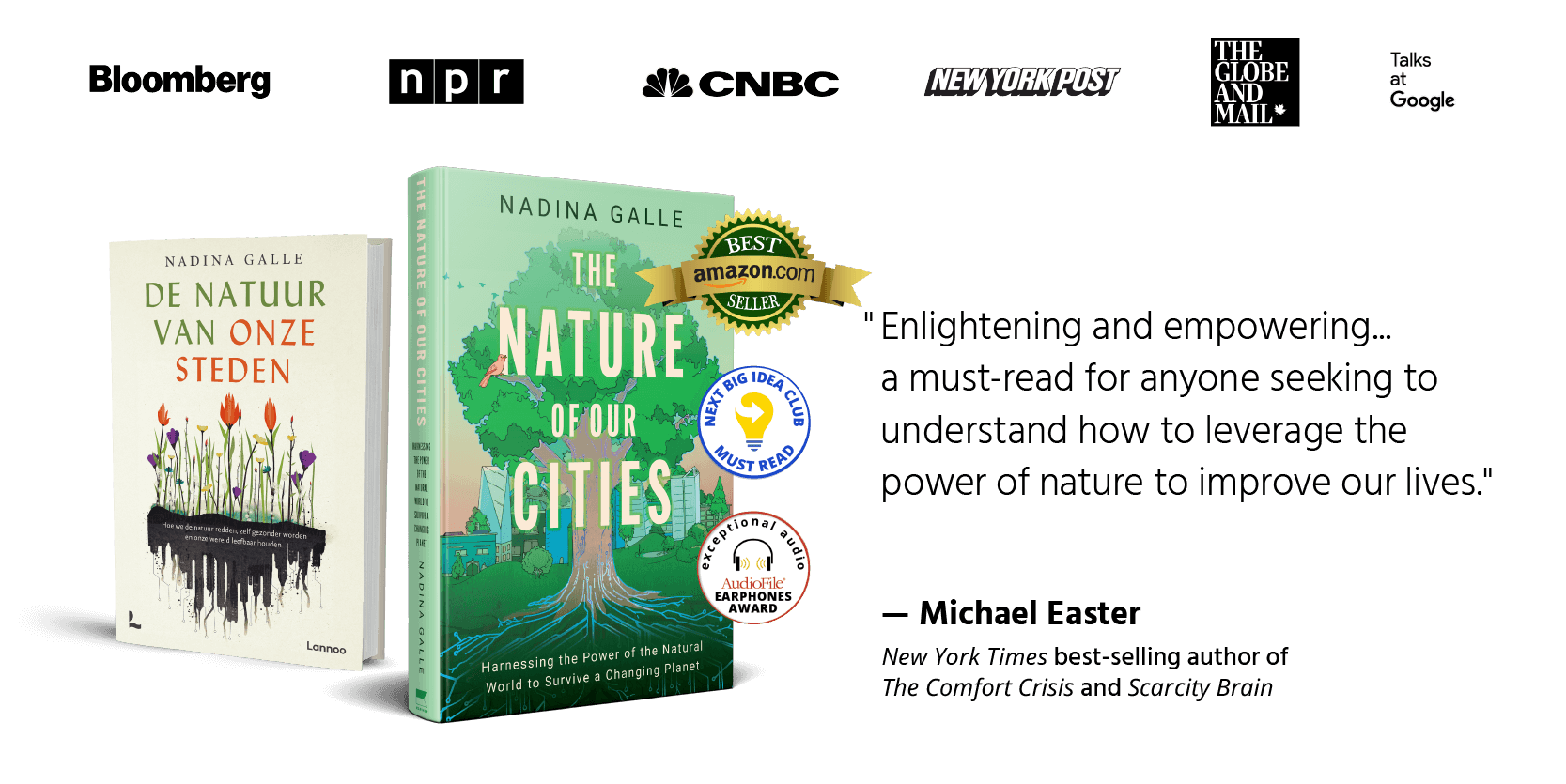
“I argue that nature is the fifth pillar of health, alongside sleep, diet, exercise, and stress reduction.” – Dr. Nadina Galle
Jackie introduces the stormy setting of Spain, which perfectly segues into Dr. Galle’s groundbreaking work. Dr. Galle passionately shares her insights on the disconnect between people and nature in urban environments, describing how modern living has transformed interactions with the natural world into a luxury experience reserved for vacations rather than everyday life. She emphasises the urgent need for reintegrating nature into urban spaces for climate resilience and holistic health.
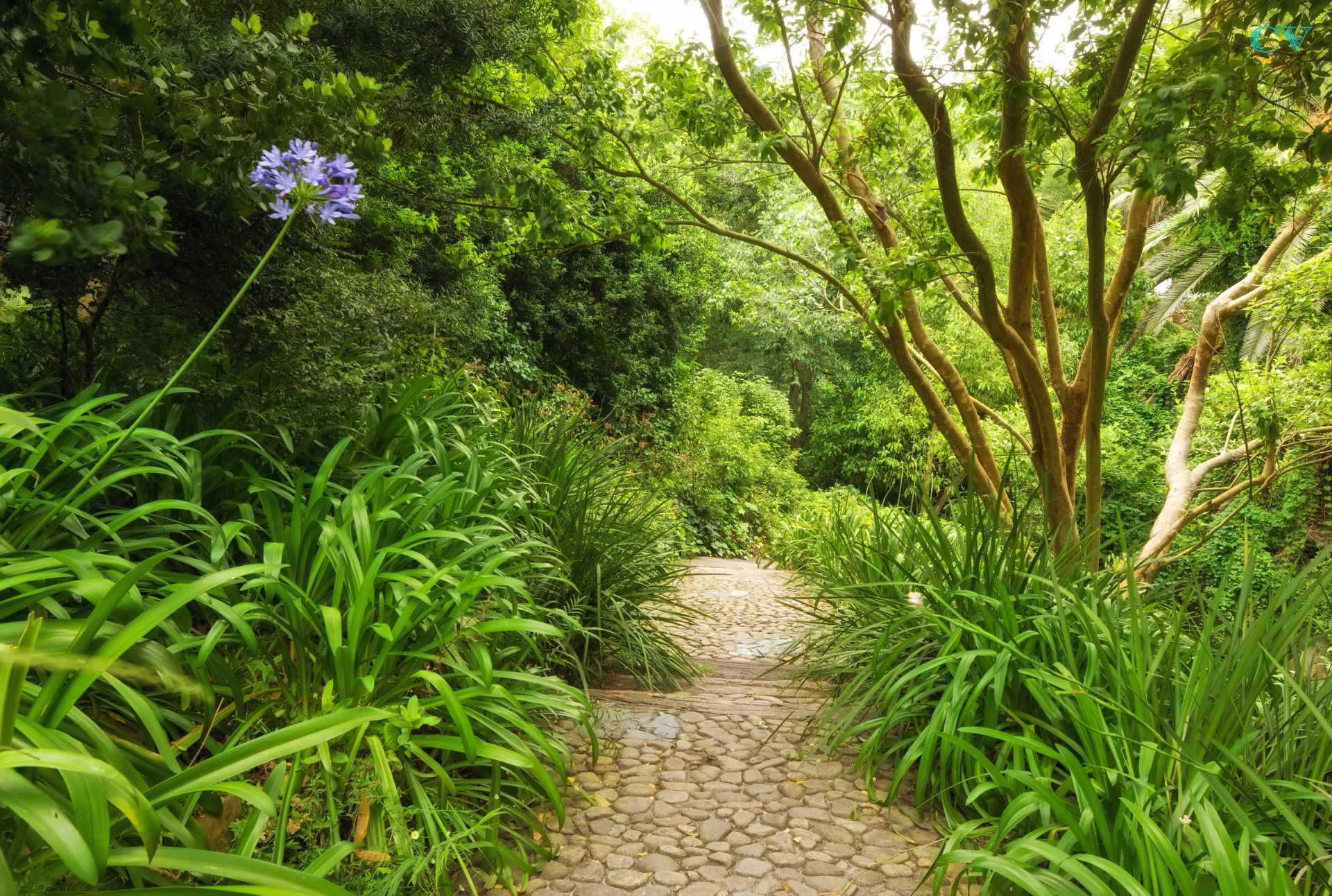
Key Topics Covered:
- Humanity’s Relationship with Nature: Dr. Galle explains how urbanization has led to a severed connection with nature, which profoundly affects physical, mental, and environmental health.
- Personal Journey and Influences: Dr. Galle shares her personal experiences growing up in suburban Canada and visiting urbanized yet nature-conscious environments in the Netherlands, sparking her passion for ecological urban planning.
- The Nature of Our Cities: Dr. Galle gives an outline of her book, highlighting its accessible narrative style that merges personal stories with critical environmental concepts. She explores how urban issues like extreme heat, biodiversity loss, and mental health can be mitigated through thoughtful nature-based solutions.
- Internet of Nature: Jackie and Dr. Galle discuss the intriguing concept of the Internet of Nature, which blends technology with natural systems to create smarter, healthier urban environments.
- Media Appearances & Recognition: From her documentary work with BBC Earth to being featured on Beautiful Media and making the Forbes 30 Under 30 list, Dr. Galle reflects on her journey to bring ecological awareness to a global audience.
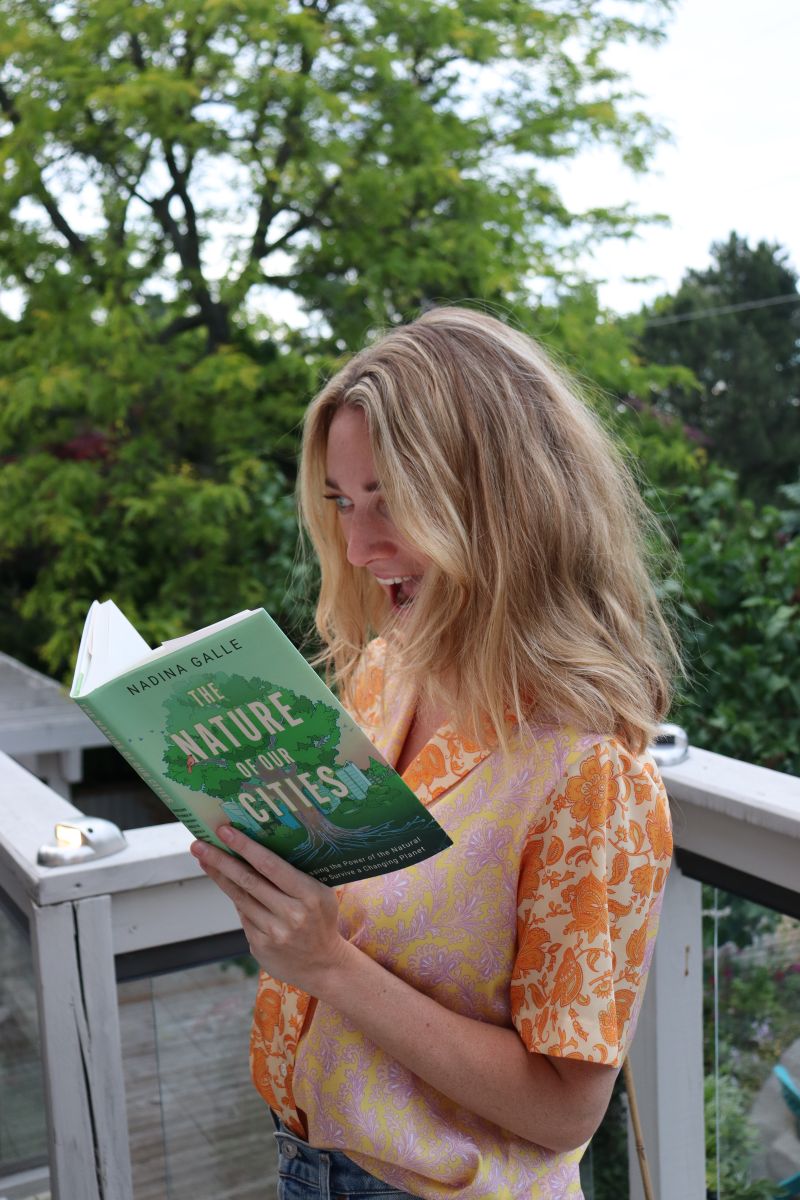
“We cannot have a future with nature until we learn how to live alongside it in our urban spaces.” – Dr. Nadina Galle
What’s Next:
This episode serves as an introduction to a special series where Dr. Galle will dive deeper into practical tools and techniques for integrating nature into urban planning. Upcoming episodes will cover:
- Nature-based climate resilience strategies.
- Innovations in urban nature management.
- Integrating nature into health strategies.
about dr. nadina galle
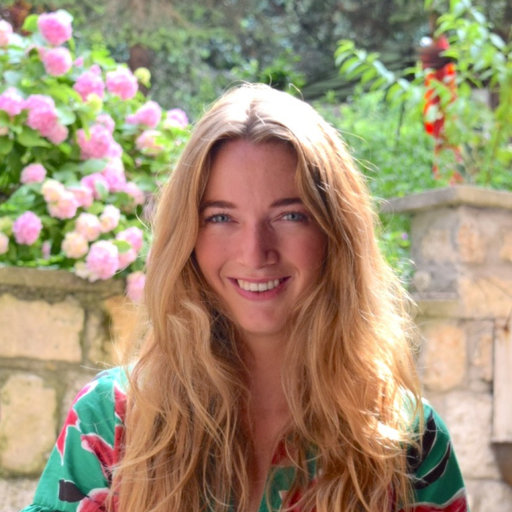
Nadina Galle, Ph.D. is a Dutch-Canadian ecological engineer, technologist, and podcaster. Her work has been featured in documentaries produced by BBC Earth and in multiple print publications, including Newsweek, ELLE, and National Geographic.
The recipient of several academic and entrepreneurial awards, including a Fulbright scholarship for a fellowship at MIT’s Senseable City Lab, she was selected by Forbes’ 30 under 30 list, and recently named a National Geographic Explorer for her work on how growing cities across Latin America are plugging into the Internet of Nature. She divides her time between Amsterdam and Toronto.
Early Life
Born in the Netherlands and raised in Canada, Dr. Nadina Galle developed a love for the outdoors and a deep commitment to conserving nature from a young age.
Foundational Inspirations & Passions
Inspired by the writings of trailblazing urbanists Jane Jacobs and James Howard Kunstler during her teenage years, she began questioning the imbalance between nature and the urban sprawl she witnessed in suburban Canada.
As an ecological engineer driven by a passion for ecology and a fascination with technology, Dr. Galle researches, develops, and brings emerging technologies to market, aiming to build better communities for both people and nature—a vision she calls the “Internet of Nature” (IoN).
The IoN has since evolved into a global movement, uniting bold practitioners who are leveraging innovative technologies to create nature-rich communities. Dr. Galle’s Internet of Nature Podcast, with over 25,000 downloads, highlights the extraordinary work of these entrepreneurs and innovators, inspiring audiences worldwide.
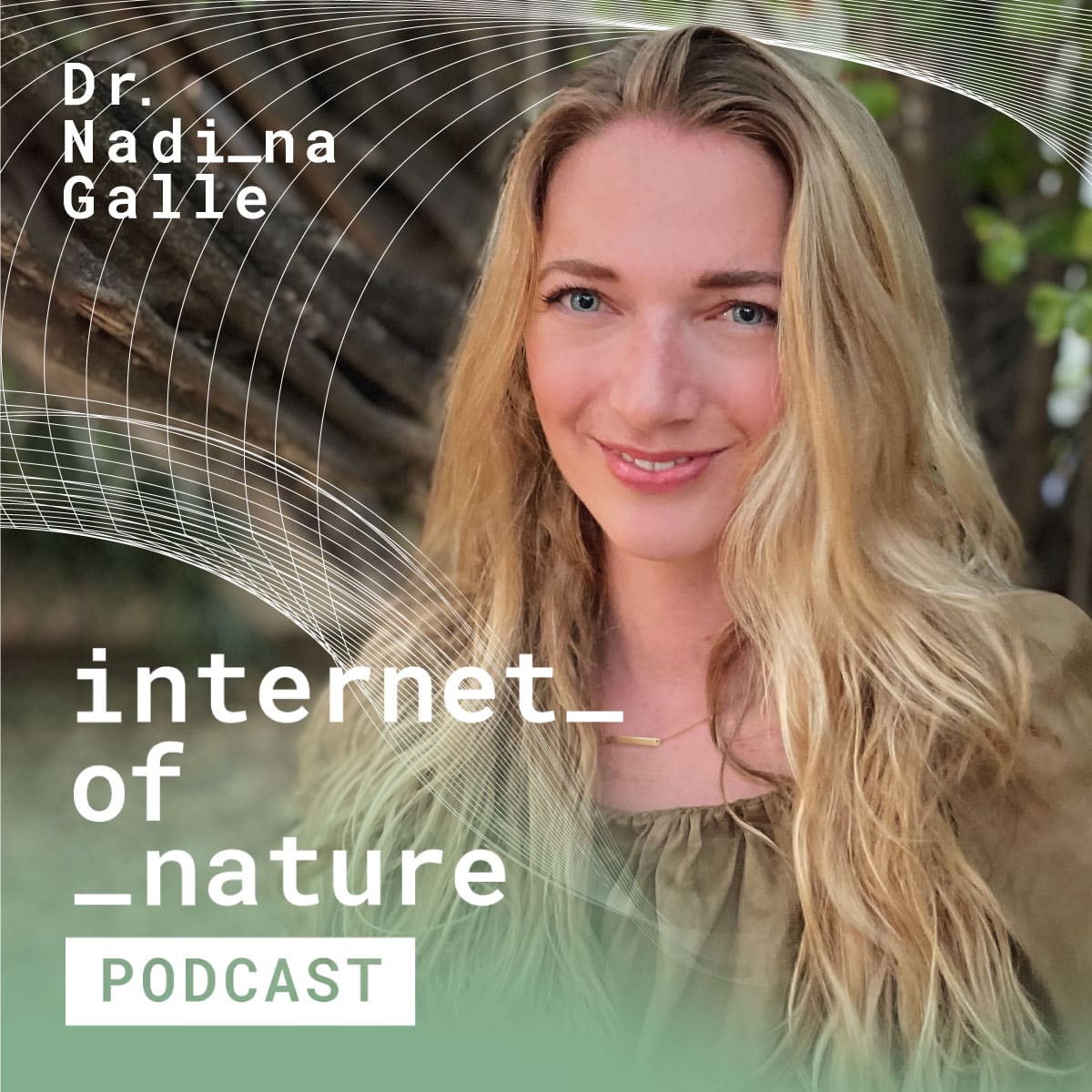
With over a decade of experience in academia across four continents, Dr. Nadina Galle has a strong foundation in scientific research. Yet, it is her combination of academic expertise and years working at—and building—tech start-ups that sets her apart. She now delivers keynotes, moderates global events, disseminates knowledge, and launches products at the intersection of nature, people, and technology.
Featured In Top Media
Dr. Galle’s work has been featured in documentaries by BBC Earth and arte.tv, on numerous British, Irish, and Dutch radio programs, and in several print publications, including Newsweek, ELLE, and National Geographic, which ran a five-page feature on her Ph.D. research.
She has received multiple academic and entrepreneurial honours, including a Fulbright scholarship for her fellowship at MIT Senseable City Lab, where she continues to hold a research affiliation. Dr. Galle has also been listed on the Sustainable Top 100 of young Dutch entrepreneurs for three consecutive years (the maximum allowed) and was awarded the European Space Agency’s top prize, a “Space Oscar,” for her work on urban tree crown delineation to combat deforestation. Forbes and Elsevier have both recognised her on their respective “30 under 30” lists.
Head In Science, Heart In Communication
Clients, colleagues, and friends appreciate Dr. Galle’s ability to take ownership of results—a quality she attributes to her honesty, empathy, and ingenuity. These traits, she believes, are essential for leading teams to achieve a shared mission.
Passionate about the path she is on—researching and building knowledge to “take nature online”—Dr. Galle takes pride in having her head in science and her heart in communication. She is dedicated to translating academic and technological discoveries into accessible public knowledge across various media.
National Geographic Explorer
In 2024, Dr. Galle was named a National Geographic Explorer, where she is investigating how cities across Latin America are integrating into the Internet of Nature.
Debut Book
Her debut book, The Nature of Our Cities: Harnessing the Power of the Natural World to Survive a Changing Planet, was published by HarperCollins on June 18, 2024, and is available to buy in these places according to where you are in the world.
Digitally generated transcript (may include some errors)
Good afternoon, this is Jackie De Burca for Constructive Voices. Once again, I’m recording from Spain. In this particular instance, it’s September and Spain is stormy with much needed rain that we’ve been waiting for for months. Which leads me very nicely into today’s guest, who is an author amongst many other. Her name is Dr. Nadina Galle, and she has written an amazing book, which is her first book called the Nature of Our Harnessing the Power of the Natural World to Survive a Changing Planet. Nadina, I would love you to say hello to the listeners and to introduce yourself.
[00:00:51] Dr. Nadina Galle: Well, hello, listeners, and hi, Jackie. Thank you so much for having me. It’s a pleasure and such an honor that you’re willing to spend so much time with me and with a lot of the ideas that are presented in this book. It’s. It’s that. I mean, that’s what writing a book was all about. So I’m flattered and very grateful.
I am a Dutch Canadian ecological engineer. I’m a technologist. I’m a keynote speaker and also a podcaster, and as a recently now published author of the Nature of Our Cities. And I would describe myself and also my work as really exploring this intersection between people, nature and technology, and how we can have the three coexist in what I call the default habitat of humankind, which are our cities and other urbanized environments. And that’s really where I’ve spent the last decade exploring and exploring, researching and then sharing those findings, whether that be through my writing, podcast, speaking. And now this book.
[00:01:56] Jackie De Burca: Fantastic. Now hopping into one of the most important questions of life today. As I see it. Nadina, how do you see humanity’s current relationship with nature?
[00:02:09] Dr. Nadina Galle: I think it’s one that has been severed. I think it’s one that has become somewhat a luxury.
Exploring or being in nature is something that we see as something that we might do on a rare weekend or perhaps on a vacation or a trip away, something that leads us feeling like, I really need this. This is something that has been long removed from my life and therefore I’m going to prioritize it on a vacation, for example. And that’s something that I’m really striving to bring back into our daily worlds, our daily habits, or this daily connection with nature. That’s really where I believe we can find climate resilience in our urban settings, the places where we live. But I also believe that’s really the key to restoring A lot of the issues that we see around mental health, our physical health, and of course, our longevity, both for ourselves, our families, and I would say, most importantly, our children.
[00:03:13] Jackie De Burca: So, Nadina, do you think that humanity in general feels separated from nature at the moment?
[00:03:20] Dr. Nadina Galle: I would say so, yes, for the vast majority of people. And I think that has a lot to do with the way that we live. I think it’s a somewhat of a natural trend as the global population has become more urbanized. That in itself has brought extraordinary wealth and innovation and a rise to the middle class for many, many people around the world. And I think that’s absolutely something to be celebrated. But with that, we’ve lost a real connection with what I argue really makes us human. And that is our connection with the natural world. And that can be something as simple as allowing ourselves the moments to feel the breeze on our face, or allowing us to ground with our feet in the soil, or allowing us to take ourselves and our children out for a walk in the park. These kinds of pockets of nature’s connection, even when living in cities, that is something I feel that we really need to prioritize. We often talk about good health in the sense of, well, we need to sleep well, we need to eat well, we need to exercise, we need to reduce our stress. And I would argue that fifth big pillar of our health is our exposure to nature. And that’s something that I believe that we’ve really lost sight of. And I think if we were to prioritize that, we would be amazed at what it does to all those other four facets of health, certainly.
[00:04:46] Jackie De Burca: So I agree with you, obviously, Nadina, coming from a place that I’ve had the luck to be quite intertwined with nature. Now, before we dive into your work and book, can you share your personal story briefly, but particularly in reference to the two environments that have influenced your younger life? Nadina?
[00:05:06] Dr. Nadina Galle: Yeah, so I think this is a deeply personal story for me. I grew up in a very typical North American suburban in southwestern Ontario in Canada. But I was born in the Netherlands. I moved there when I was six years old.
And I had the lucky privilege to be able to travel back to the Netherlands with my family and visit family and family friends there. And that really informed a lot of, I would say, really at a young age, you know, starting at age 8 or 9, this kind of comparison between the place where I lived in this typical North American suburb and the places where my cousins or family friends lived and in the Netherlands. And I felt like these neighborhoods in the Netherlands that’s not to say the Netherlands gets everything right. But I did feel like, in part because those neighborhoods were perhaps more focused on walkability or on cycling or other modes of active transport, that in doing that they also preserve more areas for nature and more parks. It was just more of a foresight within the urban planning. And I very much felt like those same natural spaces were very much an afterthought in Canadian, and I would argue, North American urban planning. And I saw this quite deeply in my, you know, my parents. The house that they still live in to this day, the house I grew up in was very much on the outskirts of a small city. And in the 20 years that I lived there, that almost became the center of the city purely because of how much development was happening outside of these outer skirts in a typical urban sprawl fashion. And I would walk through one of these new build neighborhoods on my way to the new high school which they had built to be able to compensate for all of this new population growth there. And I would do that and I would walk through these neighborhoods, which used to be forests or corn fields, and I would be walking through these neighborhoods and you would see, you know, an entire ecosystem be decimated, and then it would be, you know, filled up with these, you know, cookie cutter beige homes. And then after the fact, they would come in and plant a few trees. And that just struck me as so, so odd. I’m like, huh, so, you know, this is me at age 14, 15, like, how odd, right? Like, we would, we would completely remove all the trees. We put our homes, and then we put in trees after, like, what an inefficient way of doing things. Of course, you know, I’m older and wiser now and I understand that urban development needs to happen, and that’s very difficult in the middle of a dense forest. But I never understood why everything had to be removed. Why couldn’t we keep certain as I, as, you know, the neighborhood that my parents still in today was built in the late 70s, early 80s. And you could very much see that kind of development where they still kept huge swaths of forest in between the homes. They really prioritized walking trails between the homes, and there was a lot of trees and mature trees that were preserved. And I just thought that was so odd, like, why had we lost that? And my parents were definitely the kind of parents that like to encourage my sister and I’s hobbies and interests. So, you know, I voiced some of these concerns to my parents and my dad came back the next day with A whole pile of books that told me to read them. And then after I’d read them, we would discuss. And these were books by Jacobs, you know, famed urbanist James Howard Kunstler, who had coined this term of nowhere America. This idea of, you know, very sprawl car centric design and the threats that that brought. And that kind of started a lot of this early thinking. And a lot of it really came full circle for me when then I started studying ecology at the university.
And of course that was ecology, you know, far away from our cities. And then it wasn’t until my PhD that I kind of brought that urban focus back into light. And that’s where it really came full circle to me because I understood then that we could not possibly, as humanity have a future with nature until we realized how to live alongside it in our day to day, very urban centric lives.
[00:09:08] Jackie De Burca: How brilliant that your parents were that way inclined. I’m sure, I’m sure you must have a lot of gratitude towards those early days. And obviously between that and the rest of your fascination journey, you have written the book that we’ve mentioned earlier that this series is going to be about. We’re going to do four different shorter episodes about the nature of our cities, harnessing the power of the natural world to survive a changing planet. Nadina, I absolutely love the way that you tell the story from your own perspective. So you kind of like mix the idea of it’s a story on one hand, but it’s absolutely interspersed with so many important, you know, concepts and techniques and tools. Can you just give a very brief outline of what readers can expect to discover in your book?
[00:09:54] Dr. Nadina Galle: Absolutely, and I’m glad you picked up on that, Jackie, because that was very much my goal as well is to, to have it be a nonfiction, but written in the style of a novel. So there’s a lot of dialogue, there’s a lot of personal stories, a lot of anecdotes, and hopefully a lot of helpful lessons along the way. I’m a big fan of Malcolm Gladwell, who writes in this, well, what I hope to strive a similar kind of style where, you know, he zooms in on a very, very local story and then zooms out again to sketch the bigger global problem and what we can learn for it and then zooms back in again. So that’s very much a style I hope to emulate. And what readers can expect in the book is nine chapters sandwiched by a prologue and an epilogue. So again, kind of a nod to this fiction kind of style of book. This Prologue describes a city without nature. And it’s. It’s quite a dystopian look at what a city without nature could look like. Just to sketch really the urgency, I would say, of why the reader should be here. And we end hopefully with a happy ending with this epilogue that sketches the city with nature deeply, deeply integrated into our urban design and what people in that city are experiencing on a daily basis. And between the prologue and the epilogue are nine chapters, each of them focusing on a uniquely urban issue. So there’s a chapter on resource based management, on extreme heat, on wildfires, on flooding, on biodiversity loss, mental health, longevity, and lastly, children’s connection, or should we say disconnection to nature. And all of these chapters follow a similar kind of format where they sketch the problem with that unique urban issue, really outlining the stakes of what’s happening in today’s world and showing how nature can play an important role in that. And I think that’s the surprising thing about this book, is that nature really can. It’s such a multifaceted solution, really can have an impact on just a whole breadth of different urban issues. And then it delves into which technology specifically can help nature. How can we really maximize and optimize the role of nature within those solutions using this technological assist? And I call that the Internet of Nature.
[00:12:13] Jackie De Burca: That leads us perfectly on to the next question. Adina. I mean, I suppose what struck me is that you present that marriage between technology and nature so wonderfully and obviously, yes. Talking about the Internet of Nature, what exactly is that?
[00:12:31] Dr. Nadina Galle: Yeah, I think that’s a bit of a shocking take for a lot of people. Right? Like, there’s still a lot of people that are like, you know, what the heck are nature and technology doing in the same sentence? And there’s many different pathways for how I came to that realization, but I think the deepest, most philosophical or even spiritual one, if you can call it that, is the recognition that cities are humanity’s default habitat. Right? This is where we live. This is where the majority of people currently live and are expected to live. And when I say cities, I think people often misconstrue that as. Oh, you mean, you know, they think of Manhattan. That’s. That’s not what it. That’s not the only definition of a city. By city, I mean suburban areas, peri. Urban areas, villages, towns, anywhere where you have an urbanized setting. This is where the connection with nature is so important, both as a buffer to natural disasters that of course, are going to come with increasing frequency and ferocity. But also for our health and well being. And it essentially, you know, if I had had my way, I would have called the book the Nature of Where We Live, because that’s really is what it’s about, increasing this connection with nature where we live. But there’s also this recognition that these places where we live are extremely modern entities. Right. We’ve seen massive technological revolution in our mobility, waste management, lighting, healthcare, democracy, all of these different facets of what it means to be a human being in 2024, but we haven’t seen that in nature. And the whole goal with the book is to help bring nature online and show that if we want to integrate nature back into our modern cities, that’s going to require a modern approach. And continually having this idea that technology doesn’t play a role in that, I think is quite foolish because the stakes are incredibly high, it’s incredibly urgent. And technology, as we’ll discuss in its myriad of different ways, can offer us a tool, one of many in our toolbox, to help nature find its rightful place in our cities.
[00:14:44] Jackie De Burca: Fantastic. So you’ve been featured in so much media. I was, I was super impressed when I started doing my research on unadina.
Can you tell us about your appearance on BBC Earth?
[00:14:56] Dr. Nadina Galle: Yeah, that was a very fun documentary I got to make with Mikey Trotter, really talented filmmaker, and the team at BBC Earth. And essentially what we focused on is the role of the street tree and specifically what threatens the typical urban street tree and some of the solutions that technology can offer in aiding street trees. So it begins with an urban forester from the City of London, and she’s offering some insight into some of the most popular street tree species, because there are quite few species of trees that can survive the harsh reality of life on the street in a city.
And then I offer some insights into the dangers of having too much of a monoculture in our streets, because having too many of the same tree species, of course, opens up for massive die offs when you have a certain pest or a certain disease that might take foothold. And if you don’t have a biodiverse street forest or urban forest, you can have massive die off there, which can be quite threatening.
And some of the role that technologies play. So whether that, I mean, one of the most important ones, of course, is to accurately map the street trees that we have, because we cannot measure, we cannot manage what we do not measure. And that is quite critical because there are still so many street trees in cities around the world that simply do not have good data around them. And I really believe that good data is at the foundation of any good management plan for urban trees, but also smaller technologies like something as simple as a soil moisture sensor, which we can plant together when we plant the new tree and help trees establish faster. So they need our help. They need our help less and less. And that’s something that’s really important also for the health of the tree. It’s an odd thing. When you plant a tree in a city, you want to take good care of it because, of course, we’re putting this tree in an unnatural setting. But you also don’t want to, quote, unquote, spoil it too much, because if you spoil it too much, it can get used to the extra assistance a little bit too much. And of course, you want it to be independent and be able to grow on its own. You know, there’s kind of some beautiful parallels you can draw here between raising children as well. You want to be there for them and support them. We don’t want to spoil them too much.
The same thing with a street tree. And a moisture sensor can be used to make sure they’re getting the right amount of water at the right time. And a tree that does get. That actually grows up to three times faster. And then you can also remove it when you feel like the tree no longer needs as much support anymore. And there’s a whole host of other technologies that can play a role there. But it was one of the first kind of bigger documentaries that I got to be a part of. And it was such a wonderful experience because I, you know, coming out of academia, my main mission was to get these stories of all these innovators and these technologies out in the world. And still to this day, I am searching for the best medium to do that. And this was my first kind of foray into documentary filmmaking. And I absolutely love that medium. It’s just. It’s such an effective storytelling medium.
[00:18:20] Jackie De Burca: It is. It really is. So, yeah, you just, you did so well to get on BBC Earth, you know, relatively early in that journey, as you describe it. What about Beautiful Media, the media piece that’s entitled this Engineer is Building Eco Cities with the Internet of Nature.
[00:18:37] Dr. Nadina Galle: Yes. Beautiful Media is a South African company, and they focus much like buzzfeed used to do, or there’s another brand called Upworthy that used to do these. They really focus on finding these good news stories from around the world and shedding a spotlight on them. And I think in this world and the society of doom and gloom and, you know, devastating media coverage day after day, it’s beautiful to see these platforms take off that focus exclusively on sharing good news. And I was lucky to be part of one of these good news. They do these short videos. I think they’re only about a minute or a minute and a half long. I got to do an interview with them and then they clip it together and make this beautiful 90 second piece all about the Internet of nature and the advantages that it can offer us in our urban life.
[00:19:29] Jackie De Burca: That’s cool. It’s a fantastic concept, as you say, in the middle of all this doom and gloom media that we’re all dealing with day in and day out.
Another amazing achievement, Nadina, is the fact that you got onto the Forbes 30 under 30 list for the science and healthcare category. You must have been thrilled.
[00:19:50] Dr. Nadina Galle: Yeah, that was a pretty cool day. That was, that was quite cool. That was quite cool. And mainly just because, you know, how often does an ecologist get on the Forbes 3030 list, right? I mean, that’s something that’s reserved for, you know, even in the healthcare and science category, you know, it’s reserved for like health startup founders, you know, the immense, you know, entrepreneurs. And although I consider myself an entrepreneur, I don’t, you know, consider myself like a Silicon Valley entrepreneur. So to have a, to have the recognition for the ideas that I’m on a mission to spread on a platform like Forbes that just has, you know, such recognition was pretty incredible.
[00:20:39] Jackie De Burca: Yeah, that’s absolutely amazing. I guess it’s a, it’s a nod, at least a nod to the fact that, you know, nature is absolutely part and parcel of our health, perhaps.
[00:20:49] Dr. Nadina Galle: No, that’s exactly it. That’s exactly it. And I, you know, I felt the same way getting the book contract with HarperCollins. You know, I had, you know, this, that was a whole process in and of itself, but like finding an agent and then pitching the book proposal to multiple different imprints and publishers. And there was interest from, you know, academic presses, which, don’t get me wrong, I was already very grateful for, but I really wanted to write a book for the general public. I really wanted this to be bigger than just academia. You know, I was leaving academia to do this. So I really wanted it to be further, to go further than that. So when HarperCollins, you know, one of the big four offered me a book contract, it was exactly that, Jackie. It was this recognition of nature in our cities, in our daily lives, is critically important to the way we live and how we live, whether that be climate related or health related. And we believe that there’s enough of a story here, more than enough for a general audience. Like that was just this, that recognition in and of itself, just. Yeah. That I was happy then and there. You know, now that the book is out, it’s like an added bonus that people can read all of these stories. But that in itself, that recognition was awesome.
[00:22:05] Jackie De Burca: Well, I’m getting what the, what the Continentals call chicken skin. And we would say shivers as you’re saying that because I know, I know how important it is and such an amazing publisher for you to, you know, in your search to get your story and your knowledge out there, you know, what an amazing deal to have got and what an amazing book it is. I mean, I’m going to say that we’re coming close to the end of this first introductory episode. It is an amazing book because you’ve written it so well, you’ve so much knowledge to impart and you are telling it in that way that you described. And it really works because it’s accessible. I believe it is accessible to Joe or Jane Public to read easily, you know.
[00:22:49] Dr. Nadina Galle: Yeah. And that’s that the biggest compliment is when people say, I couldn’t put it down. It read like a fiction. There was so much dialogue, it was engaging. You know that that’s ultimately what you want because if you can, if you get people locked into the story and engaged and excited, that’s when the message is going to hit home. Right. That’s when you know they’re going to read every last single page of your book. And that’s why what I’m, you know, yes, the awards and everything is beautiful and the recognition is great. But I’m most proud of the Amazon reviews that coming in with those things right. From real readers like yourself that have read the book and felt inspired. And I would say I’m mostly proud of the fact when people say they feel optimistic and hopeful after reading the book because as I mentioned before, there’s so much doom and gloom in our world today. And that breaks my heart. You know, it breaks my heart that people are considering not having children because they’re worried about what kind of world they’re bringing them into. Like, and that there’s, you know, 12, 13, 8 year olds at school that deal with severe eco and climate anxiety. Like, that absolutely breaks my heart and I will do anything I can to help bring hope and optimism into their lives because I believe we have more than enough hope and optimism to, to determine the way that we build our cities and where we live around.
[00:24:10] Jackie De Burca: Absolutely. Nadina, your book Absolutely does. Exactly, you know, exactly what you’ve said about the Amazon reviews and the feedback that you’re getting. And you know, we’ve had a number of other guests that are different, you know, different veins, if you like, of the, of the more positive possibilities around biodiversity and climate change. There are so many tools and possibilities out there and it’s just getting more people to be aware of them. I think, I think so too.
[00:24:38] Dr. Nadina Galle: I think so too. And offering a different narrative.
[00:24:41] Jackie De Burca: Yes, absolutely. We were going to touch on your prestigious awards. You’ve almost canceled them out with what you last said, but are there any of them that you’re particularly, you know, happy about or proud of that you would like to mention?
[00:24:56] Dr. Nadina Galle: I did very much, very much enjoyed when I, in 2019, I was offered a Fulbright Scholarship to do the latter part of my PhD at the MIT Sensible City Lab, which was an absolute dream come true because that was a lab and a research group that I had looked up to for many, many years. And my PhD supervisor at university College Dublin in Trinity College Dublin, where I did my P. Ph.D. had himself 15 years ago, I think at that point spent time in the lab and he spoke about it so fondly.
But of course to go to MIT is impossible without some kind of scholarship. It’s an incredibly expensive school. So to get the Fulbright Scholarship, to be able to go for the six month period and do my field research and my lab research there was an absolute dream come true. And I still have really great connections with the lab. And you know, those kinds of awards are amazing because, you know, it’s not just a recognition, but it’s giving you the financial means to have an experience in a lab that you otherwise wouldn’t have and to be able to network and connect with people across the other side of the pond that are working on these kinds of issues is something I still benefit from every day.
[00:26:16] Jackie De Burca: I’m guessing that the people that you dealt back in my home city of Dublin, in Trinity and UCD must be more than delighted to see what you’ve gone on to do. And no doubt the same for the people who awarded you the Fulbright Scholarship.
[00:26:31] Dr. Nadina Galle: Yes, I’m very, I’m very grateful to have had just so many like, supporters really is like the right. Just mentors, supporters, just people from day one and feel like you got this, you know, whatever you need to make this happen, whether it be, you know, like a letter of reference or a, like honestly just an encouraging word.
Have just from day one being really, really supportive and the thing that they’ve been most supportive about is this mission that I felt, really, since I was little, to spread awareness about the ideas, because anyone who knew me back then also knows that I wouldn’t shut up about these ideas. So the fact that I’ve been able to make a career out of that, it really is a dream come true. So I’m. I’m indebted to everyone that’s been so supportive.
[00:27:20] Jackie De Burca: And obviously, in some belief systems, people would say the universe was supporting you there, Nadina.
[00:27:26] Dr. Nadina Galle: Definitely.
[00:27:27] Jackie De Burca: Yeah. That’s fantastic. So, listen, we’re gonna. We’re gonna bring this shorter episode to a close, but this is purely the introduction to your work. And we have three more episodes coming up that we have wisely with your advice. Obviously, split them into the tools and techniques that actually harness nature as a buffer against climate change. Then the next episode after that will be the tools and techniques for better urban nature management and monitoring. And then finally, we have the tools and best practices integrating daily nature exposure into health strategies. So there’s an awful lot to look forward to. Nadina, thank you so much and be talking to you again very soon.
[00:28:13] Dr. Nadina Galle: Thank you, Jackie. Talk soon.
[00:28:15] Jackie De Burca: This is constructive voices.






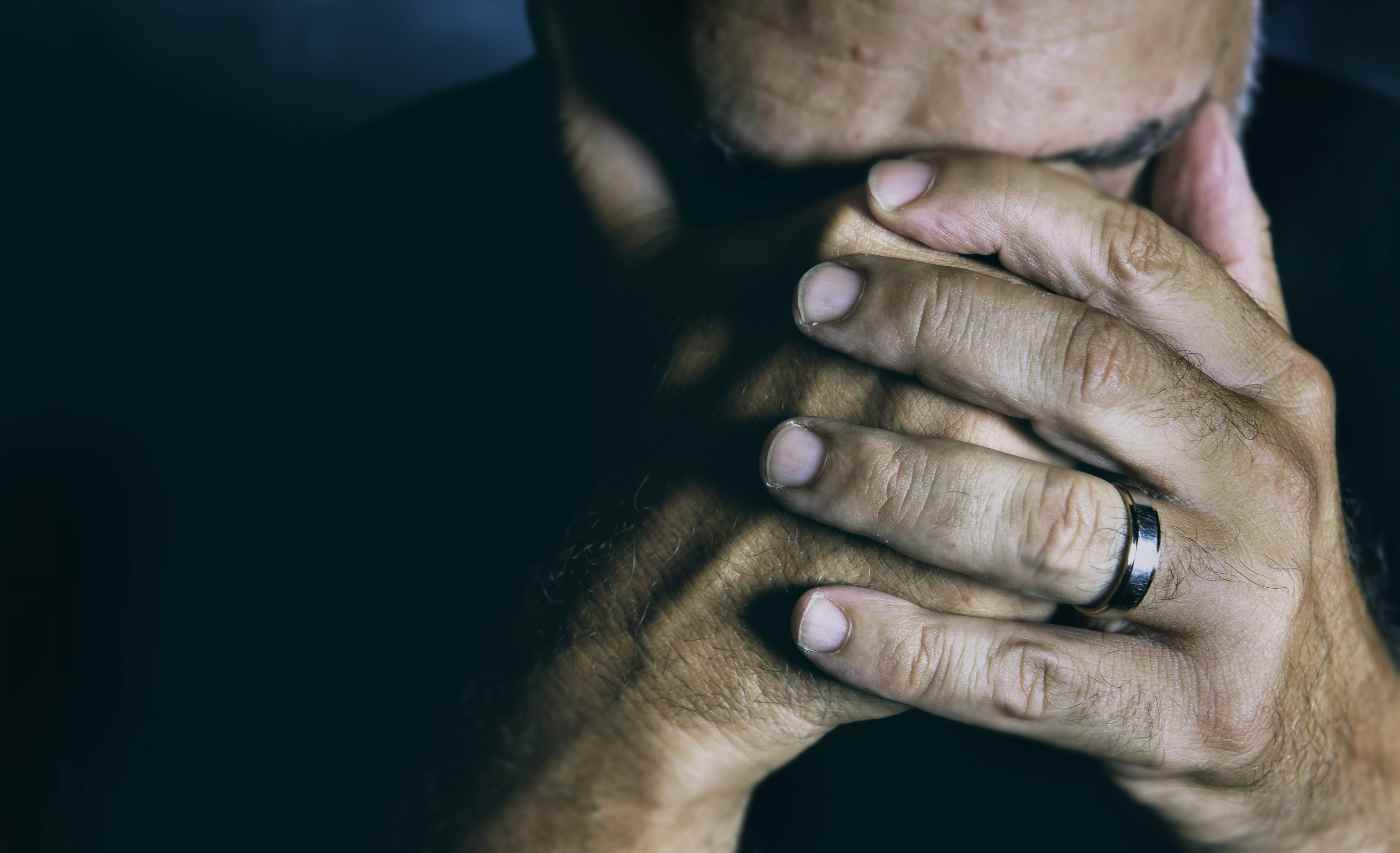

Constructive Voices Shortlisted at the 2025 Publisher Podcast Awards in Two Categories
7 months ago[…] The Nature of Our Cities with Dr. Nadina Galle (S3, E18 – E21): In this multi-part series, ecological engineer Dr. Nadina Galle explores the concept of the “Internet of Nature,” discussing how technology and ecology intersect to create smarter, greener urban spaces. Tune into Episode 1 here. […]